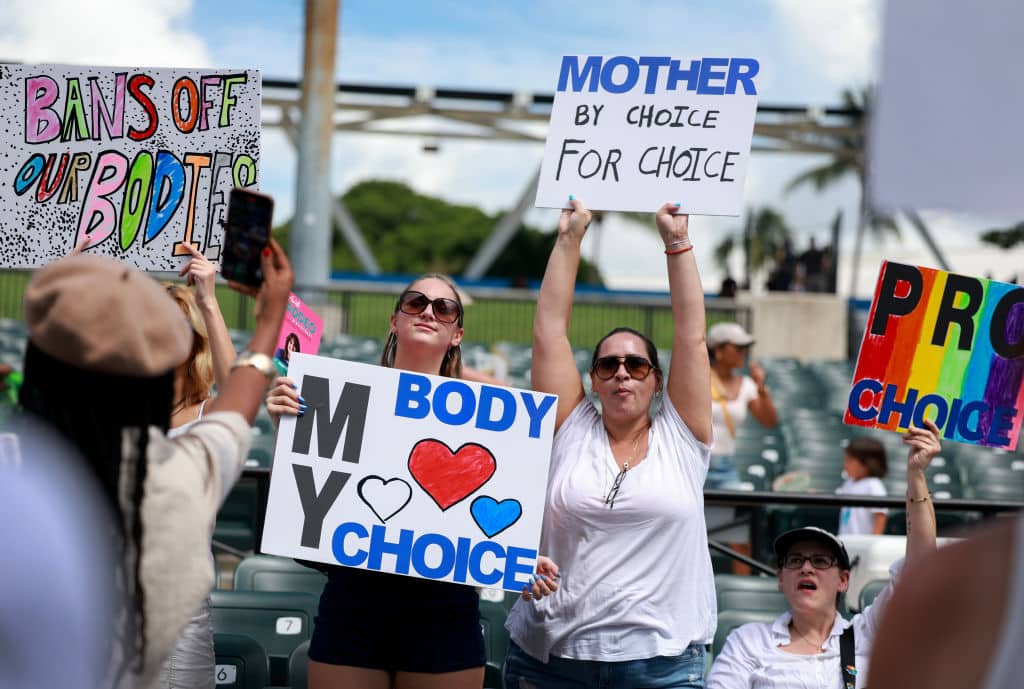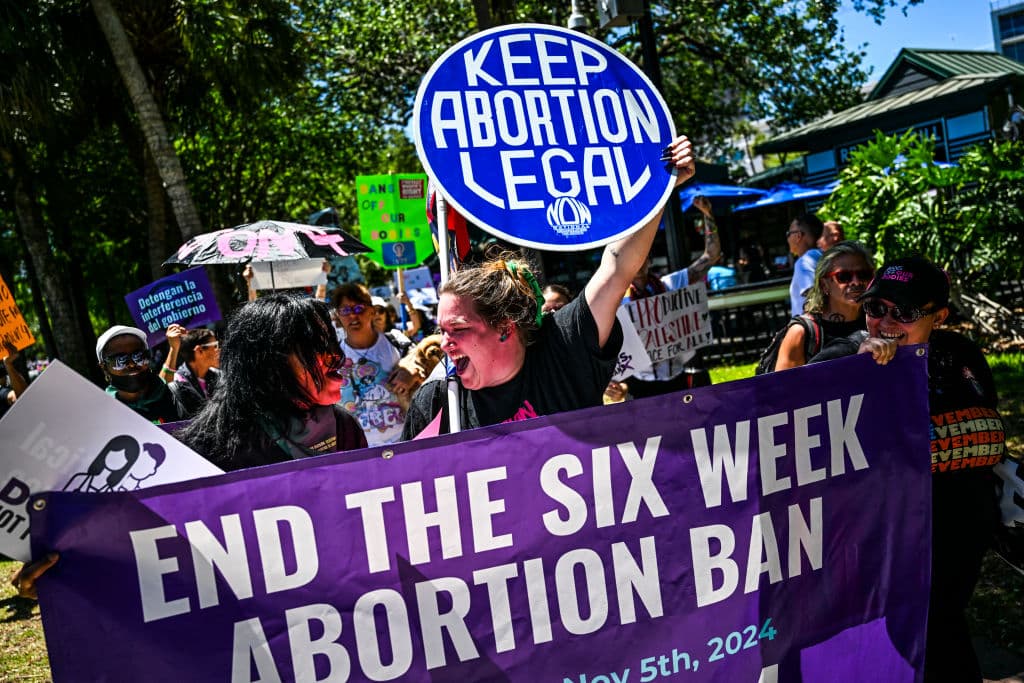While abortion was metaphorically on the ballot cross the entire United States this presidential election campaign, abortion rights were also directly on the ballot in ten US states, with eight proposals to amend state constitutions.
The measures varied significantly: in some states, voters decided on overturning restrictions imposed after the Supreme Court overturned Roe v. Wade in June 2022. In others, voters decided “whether to boost protections for the procedure and make them harder to roll back if conservatives take power,” reports the Guardian.
Seven of the ten states where abortion was on the ballot saw setbacks for the pro-life movement, with only Nebraska, Florida and South Dakota upholding current pro-life laws. Spending on ballot measures related to abortion rights exceeded $122.7 million across the country, outpacing all other issues, according to reports.
In Arizona, where a 15-week abortion limit has been in place since 2022, Proposition 139 will amend the state constitution to guarantee abortion access up to foetal viability (typically viewed around 24 weeks). It also allows exceptions beyond viability for medical reasons, including maternal mental health.
In Colorado, voters approved a measure to amend the state constitution, preventing the state government from denying, obstructing, or discriminating against individuals' “right to abortion”. This amendment also removes a constitutional provision prohibiting public funding for abortions. Colorado already allows abortion up to birth for any reason.
In New York, voters approved Proposition 1, an amendment that prohibits discrimination based on various factors, including “sex, sexual orientation, gender identity, gender expression, pregnancy, pregnancy outcomes, and reproductive healthcare and autonomy”. Although the broad language is controversial, it won’t alter existing regulations allowing abortion up to 24 weeks.
In Nevada, where abortion is legal up to 24 weeks, a constitutional amendment to enshrine the right to abortion up to foetal viability passed. However, it must also be approved in a second vote in 2026, as state constitutional amendments require two approvals.
In Maryland, voters supported an amendment putting abortion rights into the state constitution, making it challenging for future lawmakers to limit access without violating the constitution.
Missouri marked a significant loss for pro-life advocates, as it became the first state to vote to undo a ban on abortion at all stages. The amendment will allow lawmakers to restrict abortions only past foetal viability.
In Montana, where abortion is legal until viability, Constitutional Initiative 128 was approved, enshrining abortion protections in the state constitution, limiting state lawmakers' ability to infringe on these rights.
Nebraska delivered a rare pro-life victory with voters passing an amendment to enshrine the current 12-week ban into the constitution while defeating a proposal allowing abortion up to foetal viability.
In Florida, there was also a significant gain for the pro-life movement, after Amendment 4, which aimed to protect abortion rights before foetal viability and in cases where maternal health is at risk, did not secure the 60 per cent majority needed. As a result, Florida's existing six-week abortion ban remains in effect.
In South Dakota, voters rejected Amendment G, which would have allowed abortion in the first trimester and enabled the state to regulate the procedure later in pregnancy. Pro-abortion groups like the ACLU and Planned Parenthood did not endorse the amendment, doubting its impact on restoring abortion access in the state.
While President-elect Donald Trump’s win may represent a lesser evil for some pro-life supporters, the outcome is more nuanced than it appears. Trump’s stance on abortion has shifted, frustrating activists; he even vacillated on supporting the Florida six-week ban on the ballot.
His record on pro-life issues is still preferable to that of Kamala Harris and the Democrats, which has received substantial funding from Planned Parenthood and has pledged to codify Roe v. Wade federally. However, to accomplish this would require a Democratic majority in both the House and the Senate, which was always unlikely.
Many criticise Trump for having taken the energy out of the pro-life movement, which includes some arguing he initiated the reversal of Roe v. Wade too soon and before there had been proper considerations to create a culture of life within the parameters of the law on abortion.
It is arguable that having a president who publicly on occasion sides with life but seems to have little understanding of the principles behind pro-life philosophy is actually more harmful in the long run to creating a culture of life, compared to the clear position of opposition to the pro-life movement that a Harris-Walz administration would have represented.
Such debates notwithstanding, however, it’s clear that the US presidential election on 5 November marked a setback for the pro-life movement.
Photo: Protestors attend the 'Our Bodies Our Lives: A Rally for Reproductive Freedom' at the Bayfront Amphitheater in Miami, Florida, USA, 14 September 2024. The rally was held to advocate for the passage of Amendment 4, which was on Florida's November ballot, giving women a constitutional right to abortion in the state. (Photo by Joe Raedle/Getty Images.)
While abortion was metaphorically on the ballot cross the entire United States this presidential election campaign, abortion rights were also directly on the ballot in ten US states, with eight proposals to amend state constitutions.
The measures varied significantly: in some states, voters decided on overturning restrictions imposed after the Supreme Court overturned Roe v. Wade in June 2022. In others, voters decided “whether to boost protections for the procedure and make them harder to roll back if conservatives take power,” <a href="https://www.theguardian.com/us-news/ng-interactive/2024/nov/05/abortion-ballot-results-tracker-ban-states"><mark style="background-color:rgba(0, 0, 0, 0)" class="has-inline-color has-vivid-cyan-blue-color">reports</mark></a> the <em>Guardian</em>.
Seven of the ten states where abortion was on the ballot saw setbacks for the pro-life movement, with only Nebraska, Florida and South Dakota upholding current pro-life laws. Spending on ballot measures related to abortion rights exceeded $122.7 million across the country, outpacing all other issues, <a href="https://www.opensecrets.org/news/2024/10/state-ballot-measures-attract-more-than-417-million-ahead-of-election-day"><mark style="background-color:rgba(0, 0, 0, 0)" class="has-inline-color has-vivid-cyan-blue-color">according</mark></a> to reports.
In Arizona, where a 15-week abortion limit has been in place since 2022, Proposition 139 will amend the state constitution to guarantee abortion access up to foetal viability (typically viewed around 24 weeks). It also allows exceptions beyond viability for medical reasons, including maternal mental health.
In Colorado, voters approved a measure to amend the state constitution, preventing the state government from denying, obstructing, or discriminating against individuals' “right to abortion”. This amendment also removes a constitutional provision prohibiting public funding for abortions. Colorado already allows abortion up to birth for any reason.
In New York, voters approved Proposition 1, an amendment that prohibits discrimination based on various factors, including “sex, sexual orientation, gender identity, gender expression, pregnancy, pregnancy outcomes, and reproductive healthcare and autonomy”. Although the broad language is controversial, it won’t alter existing regulations allowing abortion up to 24 weeks.
In Nevada, where abortion is legal up to 24 weeks, a constitutional amendment to enshrine the right to abortion up to foetal viability passed. However, it must also be approved in a second vote in 2026, as state constitutional amendments require two approvals.
In Maryland, voters supported an amendment putting abortion rights into the state constitution, making it challenging for future lawmakers to limit access without violating the constitution.
Missouri marked a significant loss for pro-life advocates, as it became the first state to vote to undo a ban on abortion at all stages. The amendment will allow lawmakers to restrict abortions only past foetal viability.
In Montana, where abortion is legal until viability, Constitutional Initiative 128 was approved, enshrining abortion protections in the state constitution, limiting state lawmakers' ability to infringe on these rights.
Nebraska delivered a rare pro-life victory with voters passing an amendment to enshrine the current 12-week ban into the constitution while defeating a proposal allowing abortion up to foetal viability.
In Florida, there was also a significant gain for the pro-life movement, after Amendment 4, which aimed to protect abortion rights before foetal viability and in cases where maternal health is at risk, did not secure the 60 per cent majority needed. As a result, Florida's existing six-week abortion ban remains in effect.
In South Dakota, voters rejected Amendment G, which would have allowed abortion in the first trimester and enabled the state to regulate the procedure later in pregnancy. Pro-abortion groups like the ACLU and Planned Parenthood did not endorse the amendment, doubting its impact on restoring abortion access in the state.
While President-elect Donald Trump’s win may represent a lesser evil for some pro-life supporters, the outcome is more nuanced than it appears. Trump’s stance on abortion has shifted, frustrating activists; he even vacillated on supporting the Florida six-week ban on the ballot.
His record on pro-life issues is still preferable to that of Kamala Harris and the Democrats, which has received substantial funding from Planned Parenthood and has pledged to codify <em>Roe v. Wade</em> federally. However, to accomplish this would require a Democratic majority in both the House and the Senate, which was always unlikely.
Many criticise Trump for having taken the energy out of the pro-life movement, which includes some arguing he initiated the reversal of Roe v. Wade too soon and before there had been proper considerations to create a culture of life within the parameters of the law on abortion.
It is arguable that having a president who publicly on occasion sides with life but seems to have little understanding of the principles behind pro-life philosophy is actually more harmful in the long run to creating a culture of life, compared to the clear position of opposition to the pro-life movement that a Harris-Walz administration would have represented.
Such debates notwithstanding, however, it’s clear that the US presidential election on 5 November marked a setback for the pro-life movement.
<em>Photo: Protestors attend the 'Our Bodies Our Lives: A Rally for Reproductive Freedom' at the Bayfront Amphitheater in Miami, Florida, USA, 14 September 2024. The rally was held to advocate for the passage of Amendment 4, which was on Florida's November ballot, giving women a constitutional right to abortion in the state. (Photo by Joe Raedle/Getty Images.)</em>


















